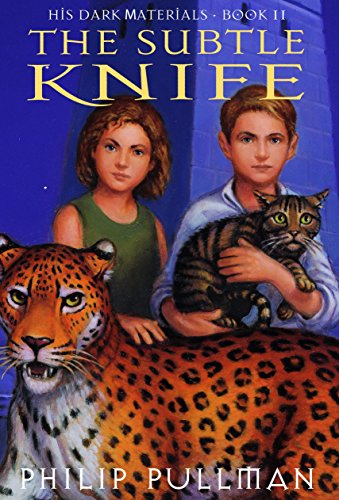emfiliane reviewed The Subtle Knife by Philip Pullman (His Dark Materials, #2)
Review of 'The Subtle Knife' on 'Goodreads'
3 stars
Aside from a few slow preachy chapters, this had some of the same action-packed excitement as the first, but there were issues that greatly cut down my enjoyment of it.
We step aside for a moment from the quest of Lyra to introduce Will, son of a lost explorer, who also somehow stumbled into the world Lyra finds herself in. They team up to discover the secrets of Dust and the Subtle Knife, what Lyra's uncle is trying to do, the purpose of the mysterious angels, and what the witches helping them want out of all this. In the meantime, Lee Scoresby looks for a shaman and passage to Lyra's new world.
"Filler" sums the plot up. There are moments that spice it up, but some of the action comes from vague sources of danger, and many pages are taken up by self-reflection rather than action. (Let's be honest, angst gets old.) One of the central characters, Lord Asriel, is almost entirely ignored, and without Lyra's search for him, the book is directionless. When Lyra very quickly changes from the firebrand scamp into a meek lady around Will, her character was almost ruined.
I do like seeing a fantasy story that takes place partially in our world, and while it's nothing like Gaiman's urban fantasies, Pullman does effectively create a healthy mixture of science and fantasy. However, compared to the rich world he created for us last time, the "real" world he sets The Subtle Knife in is grey, monotonous, and dull.
There were a few points, though, where the narrative just derailed into author tracts. When the kids mentioned the hot weather and started talking about the Greenhouse Effect, out of nowhere, all suspension of disbelief was shattered. But much worse was the speech of Lord Asriel in his rare appearance: God is evil because his followers commit crimes and it's his mission to kill him; the way it goes on and everyone immediately supports his goal reminded me of John Galt's epic speech. Equating fallible and corrupt humans with clear understanding of the will of God, and ignoring all of the millennia of argument about this (Luther, Leibniz, etc), so that Pullman appears to be more of a febrile five-year-old more interested in pushing his atheism than telling a good story. The only Church presence in the book is the very cruel and oily Mrs. Coulter, and the cardinals who condone her actions. His efforts to vilify the Church seem one-sided and mean-spirited enough to turn me off from the book, even as an atheist myself.
It is an exciting book, and at several points I felt very sad over events. But I can't read it again, with the switch to a complete black and white, Church Evil Heroes Good morality, all of the complexity of the original is gone.

